|

David Newman British "speaker" at Radio Normandy
(from 1936 to 1939)
Clarification: David was bilingual and he "handled" our
French language perfectly,
so it was in French that we exchanged our messages.
> May 28, 2007 Having found the Radio Normandie site by chance, I was very interested in reading all the information on this station as well as the articles in "Le Progrès de Fécamp" and "Le Courrier Cauchois" of November 18, 2006 commemorating the 80th anniversary of Radio Normandy. (articles published
>
here)
I was an English 'speaker' for programmes transmitted to England, having
started in 1936 in Fécamp in the studios at the back of the Bénédictine.
During the English broadcasts, there was always a French speaker
(technical assistance) and that's
how I got to know Messrs. Bécasse, Briand, Nicolas and others. At the
end of the English broadcasts at midday, we would go to the Café Thiers
on the Place of that name (now the Place du Général de Gaulle) and then
have lunch at the Hôtel Canchy and Lion d'Or. Later, I lived at the
Hôtel de la Mer on the beach next to the casino.
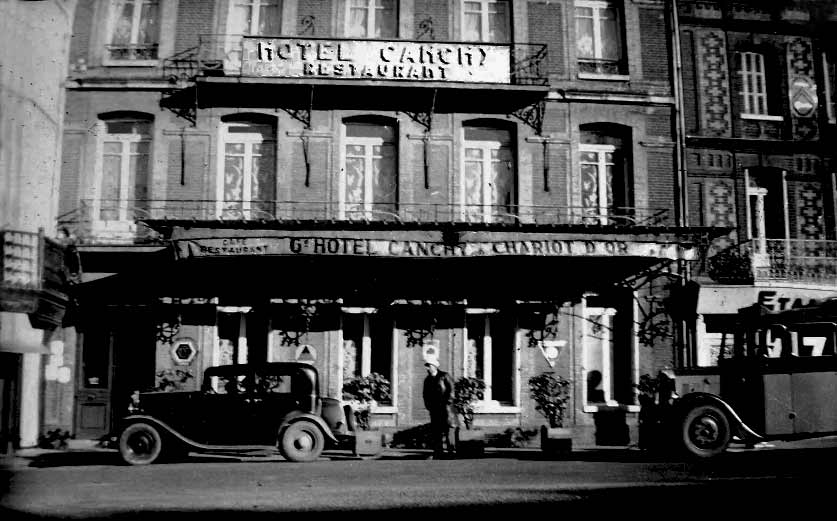
L'hôtel-restaurant
Canchy |
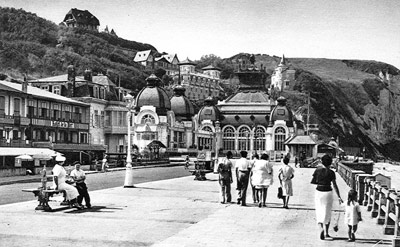
L'hôtel
de la Mer et le Casino de Fécamp |
When the Louvetot transmitter came into service, all the studios were
transferred to the Château de Caudebec-en-Caux (now the Town Hall). The
English studios were at the back of the park. These studios existed long
after the war before being demolished to make way for the Musée de la
Marine. I lived opposite the ferry at the time, with a magnificent view
of the Seine and the tidal bore. I returned to England towards the end
of 1939 after the outbreak of war.
I visited these two countries of my youth several times after the war
Fecamp and Caudebec. The two monuments that I appreciated so much were still there - the church and the House of the Templars. During my last visit, I met a Monsieur Lecœur in Yvetot. He had amassed a large stock of receiving sets and many other devices. He told me that a few members of the Le Grand family came to see him from time to time. I'm going to see Normandy again... and soon!
David Newman

Agnès, the daughter of Mr. Fernand Le Grand,
donated documents to the Constant Lecœur museum
(ph. Courrier Cauchois 18.10.1987)
> June 2, 2007 Hello David,
Thank you very much for your very interesting message. I am delighted with your interest in our pages on Radio Normandie and above all very honored to be able to correspond with an authentic speaker from this great radio station.
A few months ago, I had a message from Mr. Patrick Olivier, the nephew of Mr. Roger Olivier who was also an announcer on Radio Normandy. He was bilingual like you. Maybe you knew him? Unfortunately, I have not heard from other people who took part in this great adventure among the French personnel, except for a message from the granddaughter of Mr. Rémi Picard who was a technician at the Louvetot transmitter.
I read and re-read your letter with great interest and if I dared, perhaps you would be interested in writing a short text of memories on the way programs were made at that time. In France, we have few testimonies written on Radio Normandy. (...) All that I found as photos, documents, was published on our site. Of course, there are no sound recordings left because the war destroyed everything. Thank you for your message, David and looking forward to reading you next time!
Kind regards from Normandy. JC > June 4, 2007 Hello Jean-Claude, Thank you for your message which made me very happy. I will write a text that you ask me and will send it to you shortly. Unfortunately, I don't remember Patrick Olivier. Was he on Radio Normandy at the same time as me? Goodbye David
> June 6, 2007 Hello David,
In fact, I explained myself badly. Patrick Olivier, from whom I had received a message, was Roger Olivier's nephew. So it was Roger who was an announcer at Radio Normandie. According to his nephew (who himself got this information from his aunt), Roger spoke both languages and could present programs in English as well as in French. He was 25 in 1936. Unfortunately, I have no further details on the period when he worked at the station.
I copied for you the list of British presenters that I was able to reconstruct from the newspapers. It is incomplete but I think these names will bring back good memories! I will have to add yours. I saw that there was "Ian" and "Tom" Newman. Maybe it was you, with a pseudonym? (...)
Goodbye
JC
List (updated) of English presenters of the IBC in Fécamp and
Caudebec-en-Caux
The
speakers whose names follow were physically present in Fécamp and
Caudebec. But there were often changes.
(list reconstituted from programs published by THE RADIO PICTORIAL)
George R. Busby, IBC Studio manager
Miss L. Bailet
(June 1936) will go to Radio Mediterranean Juan-les-Pins
Godfrey Bowen (Dec 1937 to Dec 1938)
A. Campbell (January 1934 to April 1935)
JW Cummins (August 1935)
Henry Cuthbertson (July to Oct 1938)
Bob Danvers-Walker (April 1933 to January 1936) then
participated in Radio international Fecamp (late 39-40)
David J. Davies, chief DJ and transmission controller (September
1936 to September 7, 1939 - last day)
Wilfrid Thorp Devereux (May to Dec 1937)
Norman Evans (May 1938 to March 1939)
JRL Fellowes (Dec 1936 to March 1937)
Howard V Gee (dec 1936)
Maurice Griffith (June 1939 to September 7, 1939 - last day)
Godfrey Holloway (until 1939)
Ralph Hurcombe (Jan 1939 to Sep 7 1939 - last day)
W Keith Falconer (Jan 1936)
William Evelyn Kingwell, first British announcer on
September 6, 1931 then from October 11 to December 30, 1931)
Frank Lamping (April 1933)
Kenneth Macanochie (May to September 1937
Bengy Mac Nabb (April 1933 to July 1935)
Tony Melrose (June 1936) will leave for Radio Lyon
Joe Murgatroydt and Popett
Ian (David) Newman (Dec.
1936 to Sept. 7, 1939 - last day)
EJ Oesterman (Jan 1934 to Dec 1935)
Roger Olivier (bilingual French and English)
Roy Plomley (September 1936 until 1939) then participated in
Radio international Fecamp (late 39-40)
Tom Ronald (January 1934 then leaves for the Parisian post)
John Selby (Sept 1936)
Philip Slessor (no info) but briefly participated in Radio
International in 1939
Max Stanniforth (dec 1931 to February 1934) then joined
Radio Toulouse
W. Stuart-Saunders (dec 1937)
John Sullivan (January 1934 to Mar 1937)
Wilfrid Thomas (1939) (IBC Studios in London not present in
Fécamp/Caudebec)
Stephen Williams (February to June 1932 then joined Radio
Paris and Radio Luxembourg in 1933)
Graham Wilson (nov 1938)
Hilary Wontner (March to April 1938)
Clifford Sandall, sound engineer (until September 7, 1939)
Vivian Gale, sound engineer (1938)
Jack Bevierre, (French) co-manager of the nightclub (until
1939)
Valentine Kay, nightclub co-manager (until 1939)
> June 12, 2007 Hello Jean-Claude, Here is a brief explanation of how English broadcasts work from Radio Normandy.
First of all, it should be noted that most of the programs were recorded in London in the studios of the International Broadcasting Company. Then there were programs of short duration with "spot" advertisements read by ourselves and finally programs without advertisements which we called "sustainers", that is to say intended to maintain the attention of the listener, while trying or hoping to sell the space to an interested advertiser.
The broadcast hours were from 8 am to noon and from 2 pm to 6 pm in the afternoon, with at midnight, a last broadcast of one hour and two hours, on Saturday and Sunday.
There were, however, a few "live" broadcasts, notably that from Paris during the Universal Exhibition of 1937 which took place every day and which was broadcast in Fécamp (with John Sullivan); a physical culture program with two artists residing in Fécamp, transmitted three times a week early in the morning and a broadcast from Le Havre and Rouen (Armistice Day - November 11). In Caudebec, we had a duo of cowboys with their traditional songs, accompanied by guitar, and finally an orchestra of popular music in the park of the Château.
The recordings we received [from London] were sent to Paris and then sent to Fécamp.
As for the artists and speakers in your interesting list, most are known to me if not by reputation or personal acquaintance; nevertheless these artists recorded their programs in the studios of the IBC [in London]. The speakers I knew were colleagues such as Sullivan, Plomley, Davies, Gee and others. There were quite a few changes. The signatory of this message is indeed Ian Newman ; Tom Newman and Roger Olivier are unknown to me.
Finally, the President of our organization was called Captain Leonard Plugge whose biography
(1) will be published this year. He was quite an extraordinary man.
So. I hope I provided the information you requested.
Best regards !
David Newman
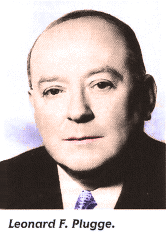
Captain Leonard F. Plugge, British businessman,
at the origin of the English broadcasts of Radio Normandie
- - - - - - - - - - - - - - - - - - -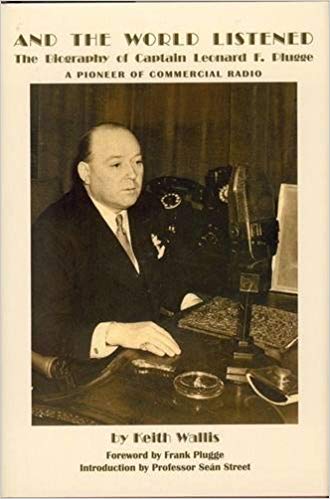
(1) The book by Keith Wallis mentioned by David Newman
is the biography of Captain Leonard F. Plugge, the man who
organized the English broadcasts on Radio Normandie.
Keith Wallis knew all the characters mentioned here
and remembers many interesting memories of this
time that he gathered in his book published in 2008:

" AND THE WORLD LISTENED" - Keith Wallis
(Editions Kelly Books - London)
We asked David some additional questions:
> On June 13, 2007,
Hello David,
Thank you very much for all this valuable information about Radio Normandy. Reading your last message, we see that there were a lot of programs in English. During other hours, it is assumed that the transmitter remained on for French broadcasts?
The French who listened to the broadcasts in English did not understand, of course, but greatly appreciated the music and the good orchestras that were broadcast. The waves could reach England and London in broad daylight and at night the range was increased. This is surprising because the power was not very large compared to the power of today's transmitters.
About Captain Plugge, I indeed read that he was a great character, an adventurer. It was thanks to him that everything really started. I think he encouraged Monsieur Le Grand to see much further with his little transmitter which was just a hobby before they met. I look forward to reading his biography with the book by Mr. Keith Wallis (...)
JC
> June 13, 2007
Hello again Jean-Claude,
I just received your always interesting message. I must apologize for the delay in responding to the previous one due to a technical problem.
I'll send you more news by searching my memory if I can capture it!
I had Keith Wallis at my house a month ago. He has a lot of documents. I have asked the editors to let me know the publication date and I will let you know.
With my best feelings.
David Newman
> June 15, 2007
Jean-Claude
I come back to your last message to take up some remarks on the subject of Radio Normandie broadcasts. In fact, the transmitter remained on outside of English broadcasts and there was an equivalence in hours between the two transmissions. At the beginning in Fécamp, the programs were picked up in the south of England. Later, with the entry into service of Louvetot, the range had become more important. In London, a department of statistics dealt with research on the number of listeners following the programmes. We could only judge by the number of letters received at the station.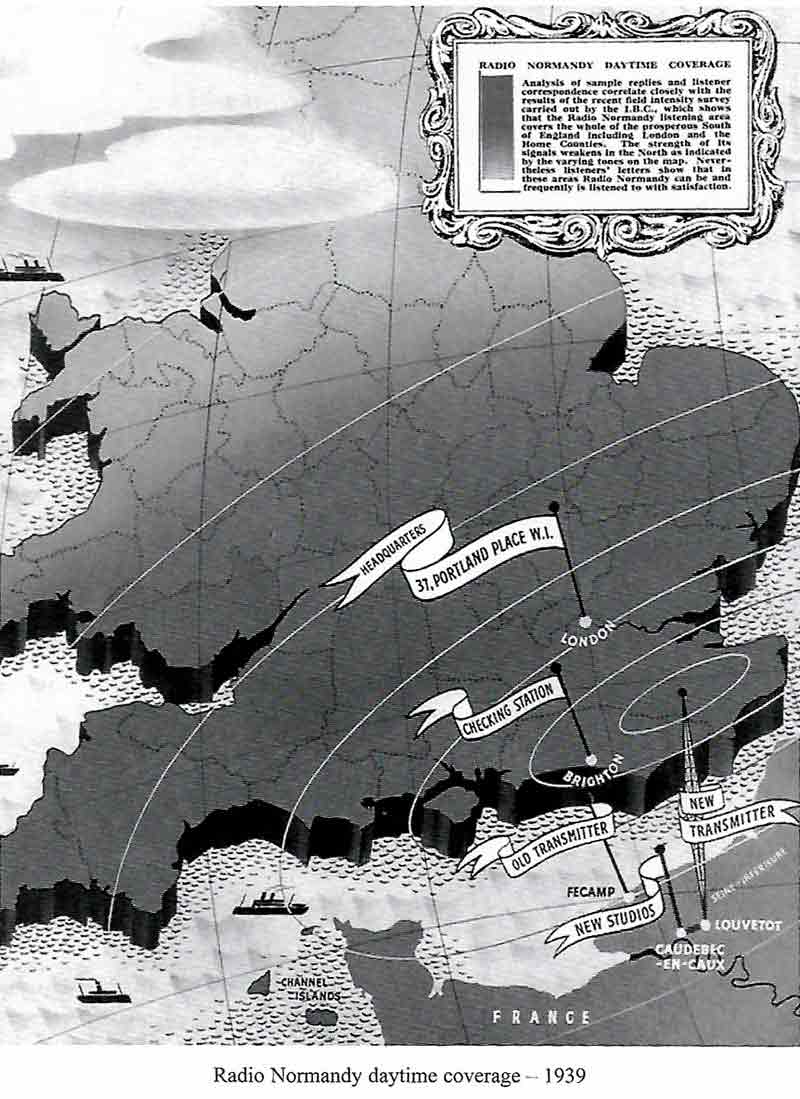
I told you about Keith Wallis and his biography (on Captain Plugge) which is due out this year. He himself knew (met) all these characters and we recalled interesting memories of that time. I will let you know when this book is published.
Do you have copies of the
news-paper "Courrier Cauchois" of 23.08.1997, 13.09.1997 and September 20 as well? I found these pages among my papers on Radio Normandie.
Sincerely
David Newman
The listening area of Radio Normandie in the United Kingdom
>>>
JC: Yes, I have these press clippings. You can see the Louvetot building burnt down and the pylon knocked down in the grass (...) > to be found HERE
QUESTIONS - ANSWERS...
> June 19, 2007:
JC: I had heard somewhere that some evenings , in clear weather, the airwaves passed so wonderfully well, you could believe that the retransmission of a show recorded in England took place "live", while in the studio, you were the only one to provide the technique. On this subject, was there a technician with you, to assist you or did you do all the technique yourself?
DN: We did indeed have an English technician who was part of the staff. He was responsible for the films and their projection just like in the cinema. These films were also recorded in England
[only the soundtrack was used on the film] . We helped him from time to time and operated the devices. We ourselves were responsible for settling the programs during our period of service - microphone, volume control, etc., during a transmission.
JC: When the Louvetot transmitter closed on September 8, 1939 because of the war, it is said that the old Fécamp transmitter resumed service for a few weeks under the name "Radio Internationale Fecamp" with the IBC (International Broadcasting Company) but without the involvement of Monsieur Le Grand. The broadcasts were stopped in January 1940 at the request of the French authorities. French troops then sabotaged the transmitter on June 10, 1940, the day before the Germans invaded Fécamp.
Did you participate in Fécamp as a speaker on these "International Radio" broadcasts?
DN: As far as Radio Internationale is concerned, I spoke to Keith Wallis about it, because these (short-lived) broadcasts took place after I left Caudebec. Only Roy Plomley had been the presenter (...). The whole story will be revealed in his book!
JC: How did the French perceive you as British during those years and what did they say when they found out you were talking on the radio every day? Did they understand the work you were doing from our home?
And you yourself, David, were aware of the importance of your work, because Luxembourg and Normandy were the very first British commercial radio stations. Did you think you were doing something illegal, advertising being banned on the airwaves in England? Did the BBC consider you pirates?
DN: There was a whole group of people in Fécamp who knew us by sight and who knew what we were doing, because the Radio Normandie operation was very well known in the town and we were friends with quite a few of them. .
At that time, the fact of constantly rubbing shoulders with English people was quite special for the inhabitants, but we were always very well regarded by everyone.
Later, we were better known because the town
Caudebec-en-Caux was smaller. We didn't feel like pirates but rather like pioneers who were participating in something innovative and unique; obviously, novelty was an important factor. It must be said that trips abroad before the last war for the English represented a great adventure. I felt the opening of great horizons with new experiences and impressions, such as the departure and arrival of the Newfoundlands for example.
And the Benedictine! It's a pity that everything has been sold and that there is no longer any Legrand linked to this historic institution! I realize that I am becoming lyrical and I stop. Don't be afraid to question me. I will always try to answer you.
David Newman
> June 26, 2007,
Hello David,
(...) The English studios were at the back of the park (Caudebec castle), did that mean that the English speakers were separated from the French? How was it with them, were relations cordial or did everyone stay on their side? I say this because I suppose the styles of presentation must have been very different between the English and the French. It suffices to compare British radio today with French radio, which is traditionally extremely talkative.
When Radio Normandie had to interrupt its broadcasts because of the war, did you immediately return to England and what became of you afterwards? Have you tried to continue your job as a presenter at the BBC for example? (...)
See you soon David,
Jean-Claude
> On July 1 , 2007,
Thank you for your message of June 26. I have watched your site with great interest and am very flattered to be the subject of such a well written page. There's a lot to study in all the material you've put together, and I commend you for that.
On re-reading my presentation on the organization of the English programs, I see that I did not sufficiently explain the place that the French speakers played with us. Here is the situation that existed:
Among the material we regularly received from London were sheets of future programs containing titles, subject, duration, etc. We had to translate these sheets into French and deliver them to the Radio Normandie office. During programs in English, the French speaker came to our cabin to make the presentation according to the sheet corresponding to the program. This was the rule both at Fécamp and at Caudebec. We were on very good terms with everyone and we often had a meal or an aperitif with one or other of the speakers depending on their break.
To tell you what became of me, first I left Caudebec towards the end of September 1939. of war).
I joined the Navy. Having served in the Mediterranean, I was transferred to England after the loss of our ship and incorporated into the torpedo boats at Dover. After my demobilization I came into contact with the BBC for radio and television but I did not pursue this path, preferring a situation which offered me the opportunity to work in foreign countries.
As an appendix to all this if you may be interested here are some notes on some
IBC staff:
- John Sullivan worked for the BBC Overseas Service.
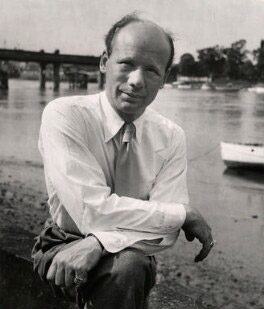 <- Roy Plomley became famous for making and presenting his "Desert Island Discs" program for 25/30 years. The program still exists with another presenter. <- Roy Plomley became famous for making and presenting his "Desert Island Discs" program for 25/30 years. The program still exists with another presenter.
- Tom Ronald also joined the BBC as a producer of variety programs.
- Bob Danvers Walker commented on Pathé News and other programs.
- Our technician
(Clifford Sandall)
and his wife were interned at La Bourboule. (deported to an internment camp?)
- Richard Meyer, Director-General of the IBC, apparently tried to set up a commercial station in the Isle of Man, without success.
(Ndw: the station David is talking about is "Manx Radio"
- George Busby, our Director in Fécamp and Caudebec, has produced films including "The Red Shoes".
From other colleagues, no news, maybe later if possible!
. |
> February 21, 2008,
Hello David,
Did you operate from the studio whose color photo we see in the Château de Caudebec or was it intended for French broadcasts only, because I believe you had another studio in an annex at the back of the park ?
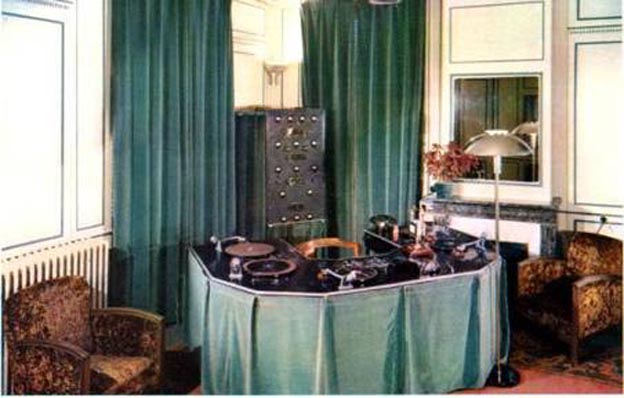
The French studio in
the castle of caudebec in 1938 and 1939
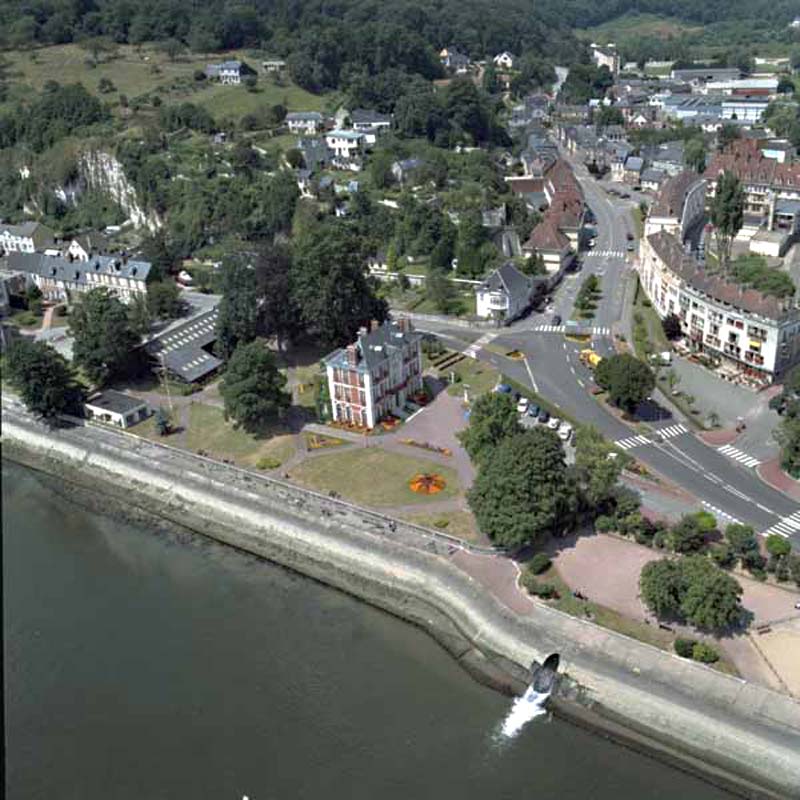
DN: In Caudebec, we had our own studios which were at the end of the park of the castle. They occupied the current location of the Musée de la Marine that can be seen in the aerial view of the castle on your site.
During my last visit I spoke with the reception staff of the Museum who knew the history of Radio Normandie and the studios.
I met other people in town who were well acquainted with the station and the post's activities. Among them Mr. Lalande (son of the owner of the beautiful Hotel de la Marine) with whom we exchanged memories of Mr. Le Grand.
He visited the studios from time to time. He walked in the evening with his daughters and we met on the quay. There was a small fair from time to time which added to the cheerfulness of the place. As I lived on the quay in front of the ferry, I was at the center of everything.

The Hotel de la Marine in Caudebec-en-Caux
JC: Do you have any personal memories of the French like Mr. Roland Violette or Mrs. Francine Lemaitre who were important figures. I understand that this lady was practically considered the director of the radio station?

DN: Francine Lemaître was indeed responsible for the French programs and I think she took over the management after Mr. Legrand. I got to know the French speakers well, but less so after leaving for Caudebec. No doubt they wanted to keep and reside in their houses or apartments in Fécamp.
My best friend there was André Bécasse. When he was on duty with me for the show from midnight to 2 a.m. in winter, once work was done, we went to the Café Thiers where Madame Cauvin served us mulled wine. My friend lived with his mother in Veules-les-Roses. He married one of the French secretaries who worked on the ground floor in our building, shortly before our transfer to Caudebec.
JC: Once again David, I sincerely thank you for the time you are willing to devote to my questions and I hope you don't mind. DN: Your questions do not bother me at all because the years spent at Radio Normandie have remained very clear and clear to me and I often think about them. So do not hesitate to ask me for other information when you want.
JC: When you talk about Café Thiers, do you really mean Fécamp? and not in Caudebec?
DN: Yes, I should have specified that it was Fécamp and that the Café Thiers was on Place Thiers (now Place du Général de Gaulle and at the corner of the route du Havre (today rue Charles Le
Borgne).
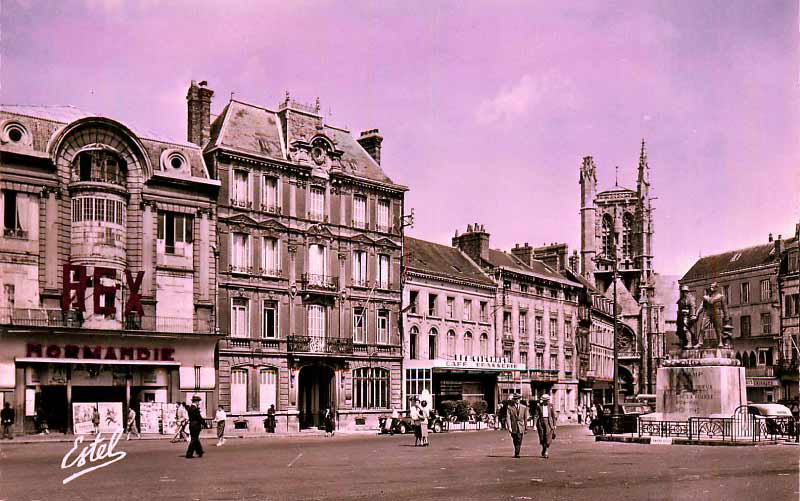
Place du Général de Gaulle (formerly Place
Thiers - Fécamp)
JC:
When you were doing the broadcasts in Fécamp, where exactly was that happening? Was it in the "Maison de la Radio" at the corner of rue Georges Cuvier and rue de Boulogne, (the street that went up to the antennas). Because Mr Les Woodland
(in his
article
here )
says that the English broadcasts were made in an attic above a Bénédictine warehouse. But the warehouses are located a little further upstream in rue Georges Cuvier.
DN: Our studios were in fact located on rue Georges Cuvier, almost opposite rue de Boulogne. In the Radio Normandie website, you will see two photos of the premises, one with a van in front and below, a view without the van: this last photo shows part of the building which is modern with three windows and curtains. But the entrance is original. There's another photo with two ladies looking up (to see where we were working at the time?). The front door does not seem to have changed.

Here is the entrance to the English studios rue Georges Cuvier in Fécamp (used until 1938)

The
English studios were in the attic under the roof until
1938
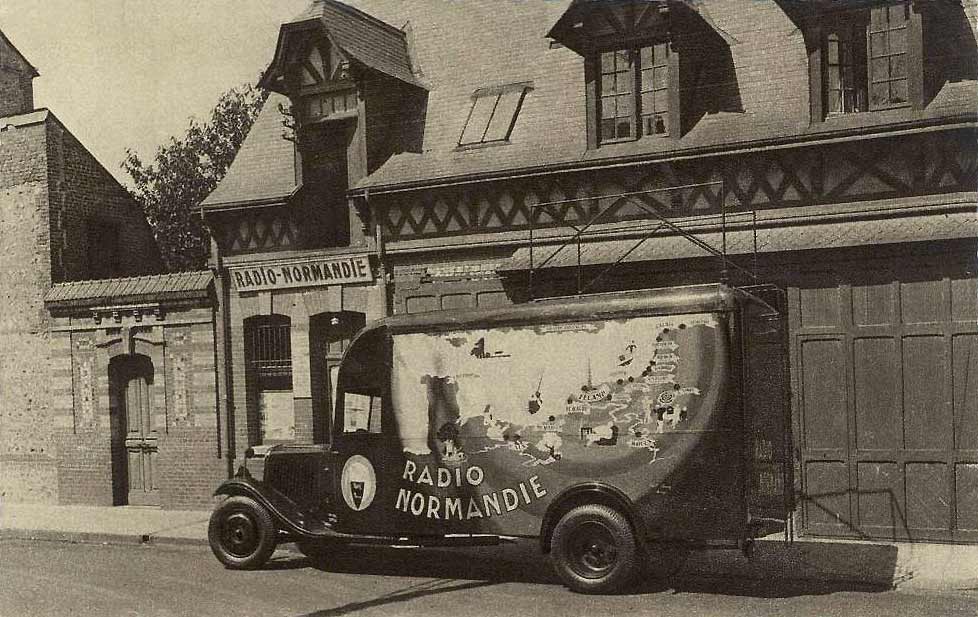
The same view around 1935. What happened to the truck?

On the other side, the French studios (the Maison de la Radio) rue de Boulogne in Fécamp
until 1938

Left : House of French broadcasts
Right : English broadcasts
JC: How was a program going?
I guess you had to play the recorded discs in the exact order.
DN: Our nocturnal broadcasts were every day from midnight to 1 a.m. except Saturdays and Sundays until 2 a.m. Returning to night programs. We worked alone. We had to arrive well before the show to start everything up, check the equipment and make sure that there were discs for the programs. Then let the French speaker enter! For the night shows (as for all programs) there was always a French speaker but he didn't have much to do.
JC: Was he there to watch you because you were very young in front of the microphone? What was his role? Was it an internal regulation to control English broadcasts?
DN: About the French speakers. I don't believe I heard anything about the idea of monitoring: I rather think it was a purely routine question. Besides, we were all happy to have a companion during these programs in the early morning and I myself took the opportunity to improve my French! The one who had been on duty the day before resumed work the next afternoon.
JC: When you finished at 1 a.m. (or 2 a.m.), was the transmitter cut or did the French programs pick up?
DN: The transmitter ended its broadcast afterwards.
JC: Can we compare your work at that time with that of a DJ (animator) today, that is to say presenting songs (on records) and advertisements. I think it wasn't easy, there must have been a lot of handling because there weren't the technical means now (there are cartridges of recorded tapes - cassettes and the computer that now manages all that ).
DN: Each program included a list of discs to be played, accompanied by the documents that had to be signed. The service announcer was responsible for his service. I remember that it was also necessary to indicate on the files, the reference to an organization of reproduction rights "B>I>E>M" (rights of authorship) and one found this acronym on the label of the disc. All these cards were sent to London immediately.
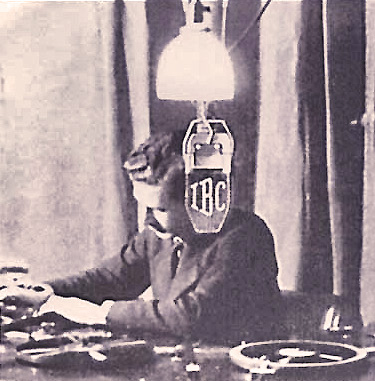 David Newman in full broadcast David Newman in full broadcast
JC: Did you have to talk often between each disc?
DN: We weren't like modern DJs at all. We limited ourselves to a few remarks before playing a record and that was it. Besides, we were bound by the duration of the program. We presented a series of discs with sometimes advertisements read by us as well.
JC: Do you remember a sentence you had to say in front of the microphone?
DN: The English speakers didn't have personal phrases. We only announced "Radio Normandy"
JC: When you spoke in front of the microphone, did you have stage fright because you were aware that there were thousands (or millions) of listeners listening to you.
DN: I must say that I only had stage fright at the start of my first show, but we were always two speakers in the studios and we could get up from time to time.

The "grey" studio
JC: How long did a program disc last before moving on to the next one?
DN: Most programs were 15 minutes long.
NB: Each record (78 rpm) lasted 3
minutes. So 5 records had to be placed on the turntables for a 15-minute
programme to be played in the right order!
JC: When we look at the photo of a studio (the "red" studio), we see two large chimes placed on each side of the control panel which do not indicate the same time, what were they used for?
DN: I did not know the red studio. It is possible that one of the clocks was used to tell the time and the other to indicate the duration of a program but I do not remember having heard of these chimes. To signal the interval between programs we used a small xylophone with its hammer.
(the one we hear
HERE
)
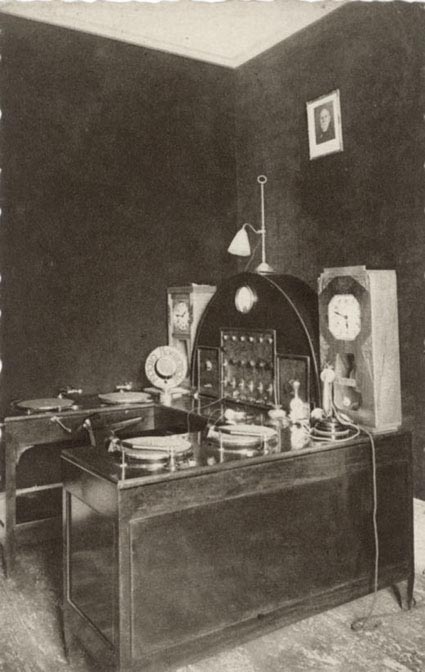
The
"red" studio
DN: I had forgotten to tell you before that there was a physical culture program in English, two or three times a week, produced by an English couple who wrote the music and the accompanying songs. Live broadcast from 7.30 in the morning using the large French studio. I hope I have given you the information you requested and see you soon! Cordially David
> On May 29, 2008,
Hello Jean-Claude,
I was reading the text of the transcription of the program "The Archive Hour" transmitted by the BBC last week and I find that your friend Mr. Cousin has done an excellent job
(
see the transcription in English ). There were some phrases and words that were difficult to understand when one or two people were speaking and I wondered if sending the full text would be of interest to you. If I can get it, I'll find a way to ship it to you.
(...)
Sincerely
David
NB: During the
following letters, David Newman kindly took over the text that we had
transcribed from the recording "The Archive Hour" and agreed to correct
our errors of understanding and the English mistakes that we had let
slip. The corrected text is here:
(
transcription in English ) A daunting job because even David admitted that there had been certain sentences from the speakers during the program that he had not entered himself. So as for us, poor French people...
> June 8, 2008,
Hello Jean-Claude,
I have been in communication with Sean Street, the author of "
The Archive Hour " program as well as Julian May, the director. Both told me that there was no text. The first explains to me that he uses key passages, that he intervenes
(that he intercalates) after the declarations of those who participate in the program making his comments etc "adhoc". Of course, he will have everything prepared in advance. Julian May tells me that in the past everything was kept but now only on computer without the full text. (...)
NB: The program "The Archive Hour" had been broadcast on BBC Radio 4, the 5.01.2008
> June 17, 2008
Hello Jean-Claude,
Sean Street is happy to know that his show is going to be featured on your site and I don't think there is any objection from anyone.
(For information, other sound documents in French and English can be found on our site here >
sound extracts
> June 21, 2008,
Hello David,
Listening to "The Archive Hour" in which you participated, I paid particular attention to what you said, especially when you describe your joy in doing this job, sitting in front of the microphone, and to speak knowing that there are people listening to you on the other side and especially people who know you. You say it's wonderful... As a former local radio volunteer, I can only agree with you, if I may dare to compare!
> On December 23, 2008,
Hello Jean-Claude,
Thank you for your last message. We hadn't been in communication for a long time, it seems to me. Nothing to report from my side. I believe that the excerpts from the German magazine (Sounds Rolling Stone nr 2 / 2008 with an article "Die Geschichte von Radio Normandy: Ein Käpt'n wird Pirat", a copy of which was sent to David) will be of interest not only to me but also for Keith Wallis who will be happy to learn that his book is still selling.
Thank you for your kind wishes and I wish you a Merry Christmas and a very Happy New Year - 2009.
Best regards
David
|
April 2009
Keith Wallis sadly informed us of the death in April 2009 of David Newman.
He was the very last surviving British announcer and probably the last witness to this great adventure that was Radio Normandie before the war. David was 94 years old. He spoke French fluently and had been corresponding with our club for several months. We have grouped together all of his radio memorabilia on the website. Keith Wallis kindly wrote his obituary which we publish below:
OBITUARY
David (Ian) Newman David was born in Richmond, Surrey in 1916. His mother died when he was only 3 years old so he was raised by his grandmother. David was educated at the Academy of Scotland in Edinburgh and later at Marlborough College.
  David on Radio
Normandy
Caudebec Studios
His first job was with a shipping company. An advertisement in the newspaper caught his attention. We were looking for presenters for Radio Normandie. He was hired and began his duties at Fécamp alongside David Davies , J. Fellows, H. Gee and J. Sullivan. As there was already a "David Newman" of the same name, employed at the IBC (International Broadcasting Company) responsible for English broadcasts, he became "Ian Newman". In 1938, the studios were moved to another location, to Caudebec but not for long as the war meant the end for Radio Normandie as well as for the other radio stations managed by the IBC. During his stay in France, David met Geneviève who would become his wife. They married in January 1939. Unfortunately, because of difficulties in obtaining a visa, he had to abandon her temporarily at his sister's house in Normandy and return alone to the United Kingdom. Eventually, they ended up in London just as David was called up. He joined the Royal Navy and was assigned to a flotilla of cruisers. He was torpedoed twice, including once aboard the cruiser "Bon Adventure" in the Mediterranean Sea. David served for seven years. After leaving the navy, David joined the Ministry of Foreign Affairs, in the diplomatic service. His first assignment was to Iceland where he could not take Geneviève. Then it was Lyon, Belgium, Poland, South America, Thailand, Tunisia and Spain. David's ability to learn languages was amazing. In each country where he served, he learned the language within three months of his arrival. His French was so impeccable that once a French national, mistaking him for a real Frenchman, asked him how could he speak English so well! At the time of his retirement, he worked at the Ministry of Defense as an interpreter for ministers and attended many NATO meetings. David was made an "Officer of the Order of the British Empire" - (OBE) by the Queen. Then, he attended the meal served in honor of a South American President during which he was His Majesty's interpreter. A little later, the queen asked him a question: "Haven't we seen each other somewhere before?" Eventually, David retired from his duties at the age of 80. But he continued to be very active thanks to his computer which allowed him to keep in touch with his old friends in Normandy. He had been invited to take part in the BBC Radio 4 programme, The Archive Hour series entitled "God, Pirates and the Ovaltineys" during which he recounted some memories of Radio Normandie. I must also express my gratitude to him for his help in promoting my book on the history of commercial radio. He died after a brief illness last April at the age of 93, leaving Geneviève alone.
 Photo – Keith Wallis - May 8, 2009
Keith Wallis – Author of ' And the World Listened' – Kelly Books Publishing
(Thanks to John Stafford)
Le Courrier Cauchois
(Local newspaper in Normandy) on August 6, 1994,
David Newman had returned to Normandy
(English
translation follows)

|
|
CAUDEBEC
Having worked for «Radio Normandie» in Caudebec-en-Caux
in 1938, M. D.F. NEWMAN remains passionate
about the «pearl of the Seine»
We could have titled this article «Mr. Newman in
love with Caudebec-en-Caux since 1938». It was this Londoner whom we met
the other Saturday and who told us: «Your city has changed a lot. I
worked here as an English announcer at Radio Normandie from 1938 until
October 1939, the declaration of war forcing me to return to England».
Indeed, radio advertising being prohibited in England, it
was emitted from Radio Normandie installed in Fécamp then in
Caudebec-en-Caux, in the Hôtel de Caumont which became the town hall of
the capital of Val de Seine.
«I was very young then, continues Mr. Newman, it was my first job and
it allowed me to perfect my French».
«He had and still has a very beautiful voice,» says Mrs. Newman,
who was then a young girl from Le Havre who was very happy to be able to
meet him with mutual friends.
«Of course, the declaration of war upset all our plans, continues Ms.
Newman. I remember it perfectly well. In particular one evening in
September 1939, I found myself there, on the terrace of the café which
was where the parking lot of the town hall is now, a few meters from the
bend at a right angle in the street which went towards the foot of the
coast of Saint-Arnoult; there were notables from the city and a
veterinarian who explained that the horses had to be in very good
condition to be mobilized so that you (you French people) could win the
war as quickly as possible».
After we explain to Mr. and Mrs. Newman how Caudebec-en-Caux had burned
down, the former announcer tells us about his journey as a veteran as an
officer in the English Navy. Thus, in 1944, embarked aboard a torpedo
launcher, he was off the Belgian coast ensuring that German ships did
not come to disturb the Normandy landings.
The war ended, demobilized, it was with his wife that he continued to
travel since he became attached to the English Foreign Affairs. Which,
in particular, led him to work in Spain, Poland and many other
countries. «Nevertheless, he says, I always remembered the good old
days spent in your pretty little town».
«Today, what do you think of this new Caudebec-en-Caux?», we ask
him. The answer is clear: «I miss your old town. It was a wonder both
more secret and more active. Today, there is no more activity on the
port. And why not have replanted this beautiful line of trees on the
quay? It was a great place to walk.»
By contrast, today, Mr. and Mrs. Newman find City Hall Park quite
pleasant. «It is a good thing to have removed the wall which
separated it from the road to Villequier. We would like to find a
«pied-à-terre» between Villequier and here», concludes Mr. Newman
and Madame adds: «He remains passionate about your charming little
town».
Interview by A.G.S. (Le Courrier Cauchois of
6.08.1994) |









 <- Roy Plomley became famous for making and presenting his "Desert Island Discs" program for 25/30 years. The program still exists with another presenter.
<- Roy Plomley became famous for making and presenting his "Desert Island Discs" program for 25/30 years. The program still exists with another presenter. 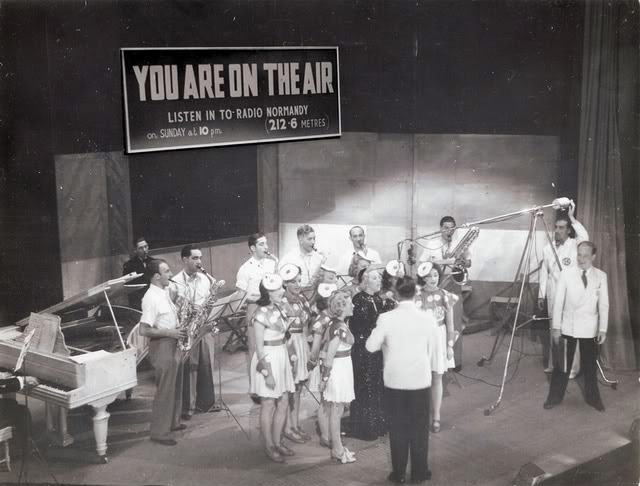










 David Newman in full broadcast
David Newman in full broadcast




